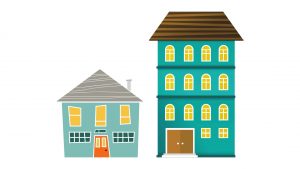What is a mortgage and how to get it
What is a mortgage?
Eventually there comes a time when you decide to live on your own. You can either rent a place or get a mortgage.
In order to buy a home, you might consider getting a mortgage. It means you are borrowing a certain amount of money from the bank to buy an apartment, a townhouse or a house now and repay that money back to the bank overtime at a particular interest rate.
The process works similar to car financing, except it is usually more money that you are borrowing and it takes longer to repay it.
A mortgage is not for everyone. And not everyone is eligible for it. Some people prefer renting over buying as it means there are less obligations (the property is managed by a property manager, renters don’t have to worry about major repairs and it is easier to relocate if necessary). However, it also means that renters are only paying for living in the place, without eventually owning it.

Here is some useful terminology:
Mortgage amount – the price of the home you are buying less the down payment, but plus the mortgage insurance (where applicable).
Down payment – the amount of money you pay upfront to get a mortgage. The minimum down payment in Canada right now is 5%. For down payments of less than 20%, home buyers are required to purchase mortgage default insurance (CMHC insurance).
Mortgage insurance – mortgage default insurance (CMHC insurance) protects the lender in the case the borrower cannot pay the mortgage. Mortgage default insurance is required on all mortgages with down payments of less than 20%, which are known as high ratio mortgages. CMHC insurance is calculated as a percentage applied to your mortgage amount.
Mortgage rate – the interest rate you will pay on the outstanding balance of your mortgage. This is determined by the mortgage type and the financial institution. The rate can be fixed or variable.
Amortization period – the duration of time it will take a homeowner to pay off their mortgage. In Canada, the maximum amortization period for insurable mortgages is 25 years. Longer amortization periods allow homeowners to make smaller monthly payments, but equate to more interest paid over the duration of the mortgage.
Mortgage type – includes the term of the mortgage (every 1-10 years the mortgage conditions need to be reviewed), and the rate type (when reviewing mortgage conditions, the homeowner can choose a variable or fixed rate). The term is for how long you commit to the terms, conditions and the rate type with a specific financial institution.
Land transfer tax – LTT is calculated as a percentage of the purchase price of a home. It is required when buying a home in Canada. All provinces have a LTT, and the amount is different in each province.
How to get a mortgage?
In order to get a mortgage, you would need to demonstrate that you are working and are able to make regular payments into your mortgage, as well as have a good credit history and credit rating. You should also have a certain amount of money saved up for a down payment.
A financial institution will assess your income, as well as other debts you might have and how you have been managing your debts so far (payments, balance, etc). Then they will offer you a certain amount of money at a particular interest rate for a specific number of years. With that information you will know what you are able to afford and start looking for a place to buy.
How much mortgage can I afford?
You can use our online mortgage calculator to help you determine how much you can potentially afford to borrow. However, a lot depends on your previous credit history and your employment status. If you have a permanent job, if you have had a credit card for a few years and have been making regular, timely payments the bank will be more likely to lend you a reasonable amount of money to purchase a home.
Say, you want to buy a townhouse in Toronto. The listed price for the townhouse is $700,000. You are buying a home for the first time, so you are eligible for the first home buyer rebate.

You talk to a number of banks and the best offer lets you borrow the necessary amount under the following conditions:
10 % down payment ($70,000)
$19,530 in mortgage insurance
25 years amortization period
1.35 % annual variable interest rate (to be reviewed in 5 years)
$10,475 provincial land transfer tax
$10,475 municipal land transfer tax (in Toronto)
-$8,475 first home buyer rebate
Under the above conditions, you would need to borrow $649,530 (includes mortgage insurance) and then make monthly payments of $2,551 over the period of 25 years to repay your mortgage. The land transfer tax and the rebate would be applied separately.
Take this interactive MORTGAGE TERMINOLOGY QUEST